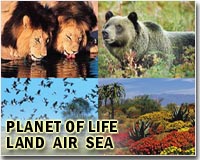 |
United Nations (AFP) Sept 22, 2010 The world is failing to stop the alarming loss of the Earth's species and habitat, a UN summit was warned Wednesday amid multinational bickering over who pays for the rescue. "Too many people still fail to grasp the implications of this destruction," UN Secretary General Ban Ki-moon warned as he called for greater international action to protect plants and animals. "I urge all leaders present today to commit to reducing biodiversity loss." Recent reports have warned that species are disappearing at up to 1,000 times the natural rate of disappearance because of human activity and now climate change. UN states have missed an agreed 2010 deadline to achieve "a significant reduction" in the rate of wildlife loss, the UN chief said. "We have all heard of the web of life. The way we live threatens to trap us in a web of death," he commented. The international community is locked in a battle however on how to set up a panel to assess Earth's biodiversity. The mooted organisation, the Intergovernmental Science Policy Platform on Biodiversity and Ecosystem Services (IPBES), would list Earth's species at global and regional level, and spell out the value of them. But diplomatic sources said the establishment of the group could be delayed, with developing countries holding out for a system that would give poor countries payments for the use of genetic "patrimony" -- unique species of plants or animals that, for instance, are found to have a commercial or medical use. This would increase income for poor economies and also be an encouragement to nurture forests, wetlands and other vital habitats, they argue. The Group of 77 developing countries, joined by China, reinforced the need for "fair and equitable sharing of benefits from the use of the biodiversity," in their presentation to the UN summit. Ban said that a meeting on the 193-nation Convention on Biological Diversity in Nagoya, Japan next month will discuss the question of how to pay for the "equitable sharing" of the benefits from natural resources. But many experts and ministers have said that the world cannot afford to delay setting up the new panel. Jose-Manuel Barroso, the European Commission president, highlighted the stakes at the UN summit. "We will not be able to mitigate climate change or adapt to its impacts, or prevent desertification and land degradation, if we don't protect our ecosystems and biodiversity," Barroso said. He said it was crucial for the Nagoya meeting next month to adopt a strategic plan that would force all countries "to raise their game; to tackle the key drivers of biodiversity loss; to prevent ecological tipping points from being reached." He said any accord with developing nations "should ensure transparency, legal certainty and predictability for those seeking access to genetic resources, as well as the fair and equitable sharing of the benefits derived from them." "We need a deal in Nagoya," said Brazil's Environment Minister Izabella Teixeira. She called on the UN summit to "raise the profile of biodiversity and galvanize the political will and engagement of all countries."
Share This Article With Planet Earth
Related Links Darwin Today At TerraDaily.com
 UN's biodiversity plans hit snag
UN's biodiversity plans hit snagParis (AFP) Sept 21, 2010 Already deeply troubled UN plans to brake the planet's dizzying loss of species have been further damaged by a row over setting up a scientific panel to assess Earth's biodiversity, sources here say. World governments are due to discuss the species crisis in New York on Wednesday, and the consensus is likely to be bleak. Under Target 7b of the Millennium Development Goals, UN members ple ... read more |
|
| The content herein, unless otherwise known to be public domain, are Copyright 1995-2010 - SpaceDaily. AFP and UPI Wire Stories are copyright Agence France-Presse and United Press International. ESA Portal Reports are copyright European Space Agency. All NASA sourced material is public domain. Additional copyrights may apply in whole or part to other bona fide parties. Advertising does not imply endorsement,agreement or approval of any opinions, statements or information provided by SpaceDaily on any Web page published or hosted by SpaceDaily. Privacy Statement |